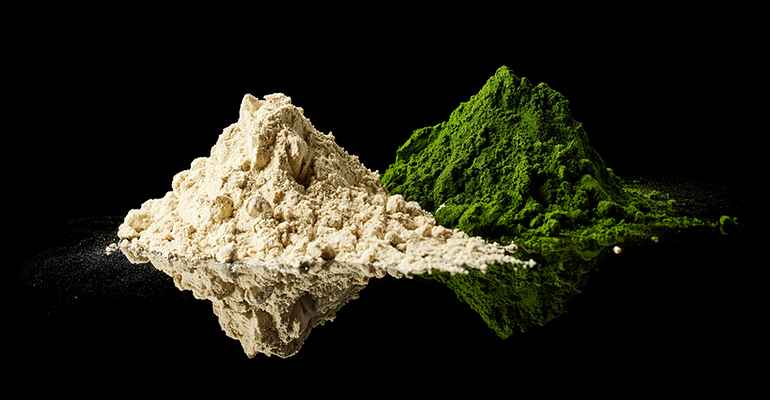News
Algae strain Chlorella appeals to environmental ingredient demands
27 May 2022
Manufacturers explore the use of Chlorella, a type of single-celled green algae known for its rich nutritional profile, to offer a vegan alternative in food and drink formulations.
With environmental consciousness at the forefront of consumers’ purchasing decisions, shoppers are increasingly opting for vegan ingredients. As a result, plant-based and microalgae ingredients are proving popular in new formulations. Chlorella is one such microalgae strain under the spotlight.

Danish company Aliga Microalgae produces the microalgae ingredient Chlorella for the food and beverage industry. It is an algae strain naturally rich in proteins, vitamins B8, B9 and B12, minerals and fibres. Aliga Microalgae states its main focus is on plant-based and protein-rich ingredients from microalgae since “this market segment is booming right now”, says David Erlandsson, co-founder of Aliga Microalgae.
Sustainable alternatives on the rise
Aliga Microalgae confirms it sees more plant-based and microalgae-led food and beverage applications. “We see an increased demand for sustainable algae-based ingredients to complement soy, pea and wheat ingredients in a broad range of food and beverages,” says Erlandsson. Key examples of these include analogue meat and seafood, savoury, bakery, dairy and confectionery formulations.
The company spotted that microalgae, particularly Chlorella, is popular in food and beverages. With increasing consumer demand for plant-based food and beverage products globally, there is also an increasing demand for sustainable, plant-based and protein-rich ingredients by food and beverage manufacturers to use in new and existing formulations, Erlandsson notes.
“Microalgae is one of the most nutritional plants that can be consumed today and in recent years, more and more food and beverage manufacturers have started to explore the usage of algae as a vegan, sustainable, plant-based and protein-rich alternative to existing crops already used,” Erlandsson says.
Choosing Chlorella as a suitable algae type
Chlorella has several main benefits, primarily its nutritious superfood profile as it contains proteins, minerals, vitamins, fibres, amino acids and fatty acids, the company notes. The ingredient is also vegan and plant-based and Aliga Microalgae has made its formulation allergen-free.
The ingredient has been consumed in Europe as a dietary supplement ingredient since the 1950s, Aliga Microalgae says. Yet, despite its long-standing use, it notes there have been challenges in its applications in food and beverage ingredients due to its high green chlorophyll pigment content and algae taste and flavour.
Overcoming undesirable features of algae
The company notes it saw this market shift back in 2018. However, it also realised that one of the most significant challenges holding microalgae back from becoming a commonly used ingredient was its strong colouring and algae flavour.
Therefore, in 2019, the Danish producer started to develop a chlorophyll-free white Chlorella designed with a neutral flavour and colour. The company believed its new ingredient would contain all the superfood properties of algae without its undesirable taste and colour.
“With an ingredient like this, we believe microalgae will be applied in more formulations and take the step from a niche ingredient to a more mainstream ingredient which we will see being used much more in the future,” says Erlandsson.
From a plant-based and protein-rich perspective, Aliga Microalgae has seen microalgae start to move in the last four-five years from mainly a dietary supplement to an ingredient that can be applied in a wide variety of foods.
The company puts the reason behind this shift down to the development of ingredients that food manufacturers can use in their formulations without negatively affecting their products’ organoleptic properties. Organoleptic qualities within food and drinks refer to their sensory properties that give them their distinction such as flavour, taste, texture and colour.
Developing a Chlorella-based formulation
Aliga Microalgae invested in two years of research and development to produce its white Chlorella ingredient. During this time, the company carried out random mutagenesis of a non-genetically modified organism variety, which refers to the process of generating a genetic mutation.
Aliga Microalgae produced a patented Chlorella strain-free of chlorophyll. The finding means that the company can develop an ingredient that is white in colour and neutral in taste and flavour. Following this conceptualisation and iterative stage, the company states it can now offer a product that can compete with soy and pea ingredients in vegan, plant-based formulations.
“Soy, pea, wheat and pulses are the most used crops in analogues today, yet all these require vast agricultural land areas to be cultivated as well as some of them contain allergens,” says Erlandsson.
Compared to other novel ingredients like insects being introduced to the marketplace, microalgae such as Chlorella has a positive reputation among consumers, Erlandsson notes. “As it is a sustainable crop that is vegan, plant-based and protein-rich, many consumers see it as a good complement to other plant-based sources being consumed today,” says Erlandsson.
Future microalgae applications
Aliga Microalgae anticipates that new developments in Chlorella production will relate to utilising its full functional capacity. However, its main opportunities will revolve around food and beverage manufacturers increasingly incorporating it into food formulations and producing new concepts, the company states.
“We see currently great demand from seafood and meat analogue producers, but dairy, bakery and savoury producers are starting to knock on our door to use this health plant in their plant-based and gluten-free formulations,” says Erlandsson.
